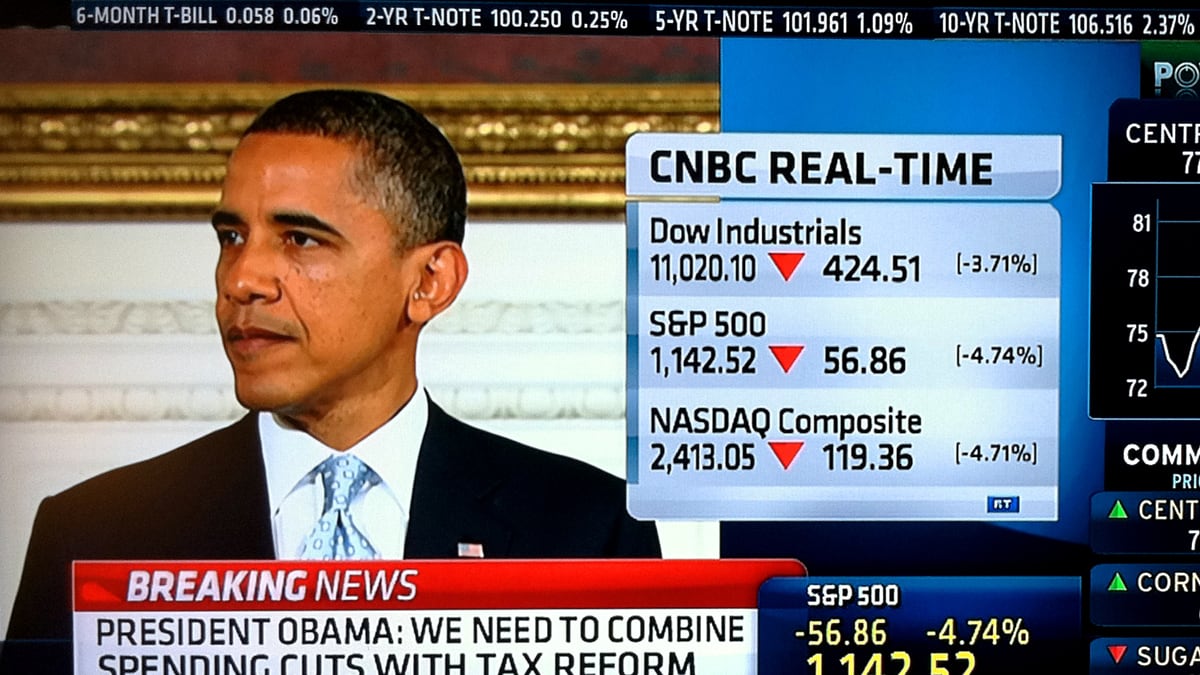Over the last few days, global markets have been surging and collapsing like a teeny-bopper’s hormones. The Monday swoon was precipitated by the downgrading of the U.S. credit rating by one of the major credit agencies, while the Tuesday resurrection was in reaction to Federal Reserve chairman Ben Bernanke’s promise to keep interest rates near zero in perpetuity if necessary.
Neither of those was a real event. Treasury risk premiums fell after the credit action, and American banks and corporations are already sitting on some $3 trillion in cash that they can’t spend. More free money won’t change anything.
Gloom descended again on Wednesday, this time because of credit worries in Europe, which is at least a real problem. A deeper reason for the high market anxiety, however, is the sad state of financial governance in both Europe and the United States.
The paralyzing standoff between the two major American parties was dramatized by the idiocies of the debt-ceiling debate. President Obama’s Monday speech only added to the nervousness by underscoring how far apart the parties were.
Europe’s incapacities have been exposed by the simmering Eurobond crises along its maritime rim, from Ireland through Portugal, Spain, Italy, Greece, and now Cyprus. Continued temporizing could destroy the euro and precipitate another financial catastrophe.
In substance, the American and European problems are quite different. In America, households borrowed against bubble-era housing-price spikes to pay for a consumer import boom. When the housing bubble popped, consumers defaulted en masse, and the crash caught the country with its social safety net down. Unemployment rates that are routine in Europe are disastrous in the U.S.

Everyone agrees that America has to rebalance the share of production and consumption in GDP. But companies won’t ratchet up investment in a time of declining demand. Short-term actions, like a payroll tax holiday and extending unemployment benefits would help. A more substantive response would be heavy public spending on jobs-intensive infrastructure and energy projects—both sorely needed in any case—ideally accompanied by strong "buy American" rules.
The problem is how to finance it. The debt-ceiling catfight has placed a lid on further borrowing, while American all-jurisdiction tax revenues, as a share of GDP, are among the lowest of the major industrial countries. A continuing gridlock around taxes and debt could mean years of economic stagnation. For a glimpse of what that means, just look at Japan.
Most of Europe navigated the crisis in decent shape, despite funneling torrents of cash into their beleaguered banks. The major economies were better balanced to begin with—German household consumption is about 58 percent of GDP, compared with about 73 percent in America (PDF)—and workers were mostly insulated from sharp drops in living standards.
Their problem is a basic flaw in the design of the monetary union. A founding principle was that high-savings countries, like Germany and the Netherlands, would not subsidize the living standards of the more profligate. Each country manages its own budgets and deficits and is responsible for its own debts. The members also pledged to keep their budget deficits under 3 percent of GDP, although there are no enforcement mechanisms.
Greece is a true profligate. Recent budget deficits were as high as 14 percent of GDP, taxes are mostly ignored, hairdressers retire on state pensions at age 50. Ireland, by contrast, is a high-productivity, low-spending country that got in trouble from a foolish promise to back the debt of its bloated banks. Portugal is a middle case, with recent deficits of nearly 7 percent of GDP.
But all three of them are saddled with debts they can’t possibly repay. All are imposing rigorous budget cuts—in Greece, the rollback of benefits has been provoking riots. But forced austerity has triggered big drops in national outputs, so the debt burdens become even more unsupportable. The flight from peripheral country bonds has now extended to Spain and Italy. Neither country is in truly bad economic shape, but both would default if they were shut out of bond markets.
The cleanest way to stop the carnage is to unify the Eurobond market—make all bonds the liabilities of all the member countries. But that would require national budgets to be approved by some form of trans-European authority. The peripheral countries would hate that as much as the Germans and the Dutch hate the idea of subsidizing the sun worshipers to the south.
So like the Americans, the Europeans are stuck. Each mini-run on Greece, or Ireland, is met with an expedient—some showy bond purchases, and in Greece’s case, an obfuscatory too-small “voluntary restructuring” of some bonds, which was really a disguised default. This week the central bank has intervened aggressively in all the peripheral country markets, and even in France, which is under attack as well. But without real structural solutions, neither the bank nor a new stability fund has the firepower to beat back a really determined attack. Remember how easily George Soros brought down the pound in a single day in 1992.
A messy Eurobond default, or the breakup of the euro zone, would have consequences on the scale of the Lehman bankruptcy that triggered the long, global, all-market dive in September 2008. And this time, there would be no magic tricks in the Federal Reserve’s or European central banks’ kit bags to pull economies up by their bootstraps.
The mantra that “the government is the problem, not the solution” applies only in good times. With global risk measures flashing redder by the day, we need functioning government on both sides of the Atlantic.





